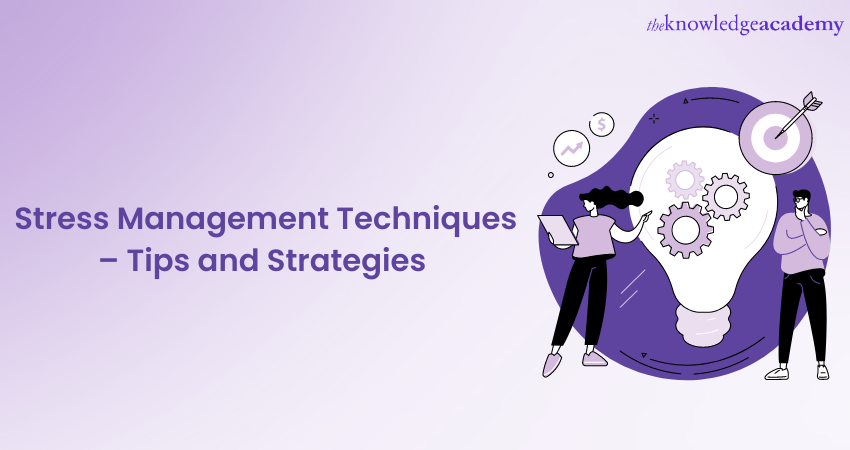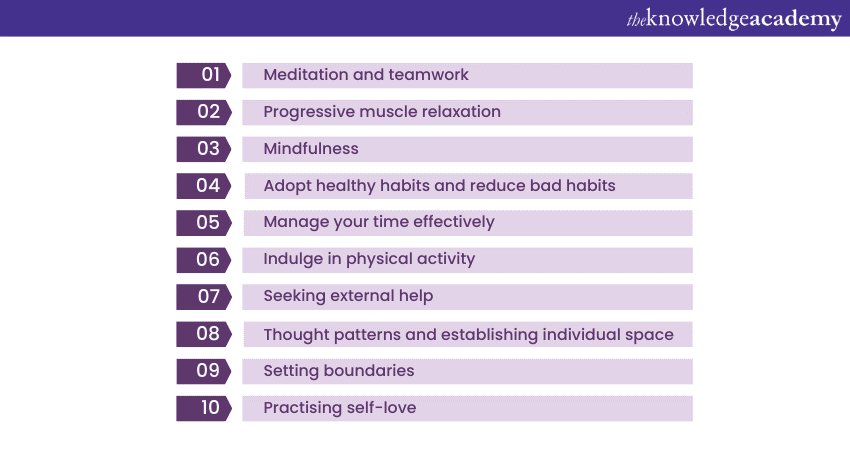We may not have the course you’re looking for. If you enquire or give us a call on +0800 780004 and speak to our training experts, we may still be able to help with your training requirements.
Training Outcomes Within Your Budget!
We ensure quality, budget-alignment, and timely delivery by our expert instructors.

Stress has become a very relevant part of our daily lives. It is of paramount importance to understand the impact Stress has on individuals, and hence knowing how to manage one’s Stress is of paramount importance. This is why many people often ask about effective Stress Management Techniques to help combat their Stress.
According to a Lancet Report, people with Stress, anxiety or depression have a 40% greater chance of developing cardiovascular and metabolic diseases than the general population. However, Stress can be managed with the right Techniques and strategies. This blog will tell you all you need to know about Stress Management Techniques, including Tips and Strategies on how to manage stress effectively.
Table of contents
1) Understanding Stress Management
2) Stress Management: Techniques and Strategies
a) Meditation and breathwork
b) Progressive muscle relaxation
c) Mindfulness
d) Adopt healthy habits and reduce bad habits
e) Manage your time effectively
f) Indulge in physical activity
g) Seeking external help
h) Thought patterns and establishing individual space
i) Setting boundaries
j) Practising self-love
3) Conclusion
Understanding Stress Management
Stress is a common experience in our lives, and learning how to manage it effectively is essential for maintaining our well-being. Stress Management involves adopting strategies and techniques to reduce the negative effects of Stress. By understanding the nature of Stress and implementing appropriate management approaches, we can improve our resilience and overall quality of life. Here are key aspects to consider when it comes to understanding Stress Management:
1) Recognising the types of Stress: Stress can manifest in different forms, such as Acute Stress, Episodic Acute Stress, and Chronic Stress. Acute Stress refers to short-term Stress caused by specific events or situations. Episodic Acute Stress occurs when someone frequently experiences Acute Stress, often due to a chaotic or overwhelming lifestyle. Chronic Stress is a persistent and long-term form of Stress that can result from ongoing challenges, such as financial difficulties or relationship problems. Understanding the types of Stress helps in identifying its triggers and implementing appropriate management techniques.
2) Identifying symptoms of Stress: Stress can manifest in various physical, emotional, and behavioural symptoms. Physical symptoms may include headaches, muscle tension, fatigue, and digestive issues. Emotional symptoms can range from irritability and mood swings to anxiety and depression. Behavioural symptoms may involve changes in appetite, sleep disturbances, social withdrawal, or substance abuse. Recognising these symptoms is crucial for early intervention and effective Stress Management.
3) Stress perception and coping styles: Individuals perceive and respond to Stress differently. Some people may view Stress as a challenge, while others see it as a threat. Our coping styles play a significant role in managing Stress. Healthy coping mechanisms should be incorporated such as seeking social support, practising relaxation often, and problem-solving, which can help in mitigating Stress. Unhealthy coping mechanisms, such as excessive alcohol consumption or avoidance behaviours, may provide temporary relief but contribute to long-term negative consequences. Understanding our personal perception of Stress and coping mechanisms allow us to make conscious choices to develop healthier strategies.
Take control of your Stress levels and enhance your well-being with our comprehensive Stress Management Training Course. Sign up now!
Stress Management: Techniques and Strategies
Stress Management Techniques are strategies and practises designed to help individuals effectively cope with and reduce Stress levels in their lives. These strategies aim to provide individuals with practical tools and approaches to navigate through Stressful situations, promote relaxation, and enhance their overall well-being. Understanding and implementing various Stress Management Techniques can empower individuals to take control of their Stress responses and lead a better life. Incorporate these below tips to significantly improve managing your Stress and take charge of your life!

Meditation and breathwork
Deep breathing exercises involve taking slow, deep breaths, giving special focus on inhalation and exhalation. This technique helps activate the body's relaxation response, reducing the physiological symptoms associated with Stress, such as increased heart rate and shallow breathing. Additionally, meditation is a healthy practice that involves focusing attention and eliminating the stream of negative thoughts that may be causing Stress. Regular meditation has been proven to improve one's overall well-being, reduce Stress and anxiety, and promote emotional balance.
Progressive muscle relaxation
Progressive muscle relaxation includes systematically tensing and releasing different sets of muscles in the body. By progressively relaxing each muscle group, individuals can promote a state of deep relaxation, alleviate muscle tension, and reduce Stress.
Mindfulness
Similar to muscle relaxation, mindfulness is a mental rejuvenation. It can be described as being fully present at the moment, observing thoughts and emotions without judgment. By cultivating attentiveness, individuals can develop a greater sense of self-awareness and learn to respond to stressors in a more balanced and intentional manner. Mindfulness meditation, mindful eating, or simply taking moments throughout the day to pause and focus on your breath can help you cultivate mindfulness.
Looking for ways to take control of your Stress levels? Enhance your well-being with our comprehensive Stress Management Training Course. Sign up now!
Adopt healthy habits and reduce bad habits
Adopting a healthy lifestyle involves reducing bad habits that contribute to Stress. This includes incorporating healthy choices such as getting sufficient sleep, maintaining a balanced diet, reducing caffeine, engaging in regular physical activity, getting sufficient sleep, and reducing alcohol consumption. Furthermore, avoiding unhealthy habits such as smoking or excessive use of electronic devices is highly recommended.
Manage your time effectively
Effective time management with the help of scheduling helps individuals prioritise tasks, set realistic goals, and allocate time for important activities. By managing time efficiently, individuals can reduce feelings of being overwhelmed. Poor time management often leads to increased stress levels. Prioritise tasks, set realistic goals, and establish a schedule that allows for breaks and downtime. Effective time management reduces the feeling of being overwhelmed and helps you maintain a better work-life balance.
Indulge in physical activity
Exercising is not just beneficial for physical health but also for effectively managing Stress. Engaging in regular physical activities results in the release of endorphins, which can be defined as natural mood-boosting hormones. Find activities you enjoy, whether it's going for a walk, practising yoga, or playing your favourite sport, and make them a part of your routine.
Seeking external help
Cultivate relationships with supportive individuals who can provide emotional support and guidance during stressful times. Share your concerns and seek advice from trusted friends, family members, or support groups. Sometimes, simply talking about your Stress can alleviate its burden. If you find that Stress is significantly impacting your daily life, consider seeking professional help. Mental health professionals, like therapists or counsellors, can present valuable guidance and support tailored to your specific needs. They can also help you develop your own coping mechanisms and navigate through challenging times.
Thought patterns and establishing individual space
Start by identifying the specific situations, events, or factors that trigger Stress in your life. This awareness allows you to better understand the root causes of your Stress and develop targeted strategies to manage them effectively. Cognitive restructuring is one of the techniques which involves identifying and challenging negative thought patterns that contribute to Stress and replacing them with positive and realistic thoughts. By reframing negative thinking, individuals can reduce Stress and develop a more resilient mindset.
Want to build resilience and master Stress Management Techniques to thrive in challenging times? Join our Handle Stress and Develop Your Resilience Course today!
Setting boundaries
Establishing healthy boundaries in personal and professional relationships is essential for managing Stress. Learning to say no, setting limits on commitments, and prioritising self-care are crucial aspects of setting boundaries and preventing excessive Stress.
Practising self-love
Self-care is crucial for managing Stress. Engage in activities that promote relaxation and rejuvenation, such as taking a warm bath, reading a book, or engaging in hobbies you enjoy. Incorporate relaxation into your daily life to combat Stress. Deep breathing exercises, meditation, and muscle relaxation are effective tools for inducing a state of calm and reducing Stress levels. Find activities that help you relax and unwind. This could include listening to soothing music, practising aromatherapy, journaling, or spending time in nature. Engaging in activities that are certain to bring you joy and peace can counteract the negative effects of Stress.

Conclusion
In conclusion, effective Stress Management Techniques empower individuals to navigate Stress, promote well-being, and lead a balanced life. By identifying triggers, practising self-care, maintaining a healthy lifestyle, and seeking support, we can reduce Stress's negative impact. It is important to remember that the effective management of Stress is an ongoing process, and by implementing these strategies – we can enhance resilience and improve our overall quality of life.
Want to unlock your full potential and embark on a journey of personal growth? Sign up for our transformative Personal Development Training Courses today!
Frequently Asked Questions
Upcoming Business Skills Resources Batches & Dates
Date
 Stress Management Course
Stress Management Course
Fri 17th Jan 2025
Fri 21st Mar 2025
Fri 16th May 2025
Fri 18th Jul 2025
Fri 19th Sep 2025
Fri 21st Nov 2025







 Top Rated Course
Top Rated Course


 If you wish to make any changes to your course, please
If you wish to make any changes to your course, please


